University Research Proposal: Breast Cancer Treatment and Aftercare
VerifiedAdded on 2022/08/08
|11
|2774
|24
Report
AI Summary
This research proposal investigates breast cancer treatment and aftercare strategies, focusing on the effectiveness of mastectomy as an intervention and the role of breathing exercises and smoking cessation in post-operative care for African British women in the UK. The study aims to understand factors contributing to the deterioration of breast cancer symptoms, identify facilitators and barriers to effective treatment and aftercare, and assess the impact of psychosocial addictions on disease prognosis. It also emphasizes the importance of cultural competence in delivering breast cancer care. The research highlights the significance of addressing social determinants of health, such as socioeconomic factors and lack of awareness, in improving patient outcomes. The proposal outlines objectives to analyze the impact of mastectomy and aftercare interventions, offering insights into culturally sensitive approaches to breast cancer management, particularly in the context of smoking cessation and the integration of breathing exercises. The study seeks to contribute to improved treatment and aftercare protocols, addressing the significant public health challenges associated with breast cancer in the community.

Running head: Research proposal
Research proposal
Name of Student
Name of University
Author note
Research proposal
Name of Student
Name of University
Author note
Paraphrase This Document
Need a fresh take? Get an instant paraphrase of this document with our AI Paraphraser
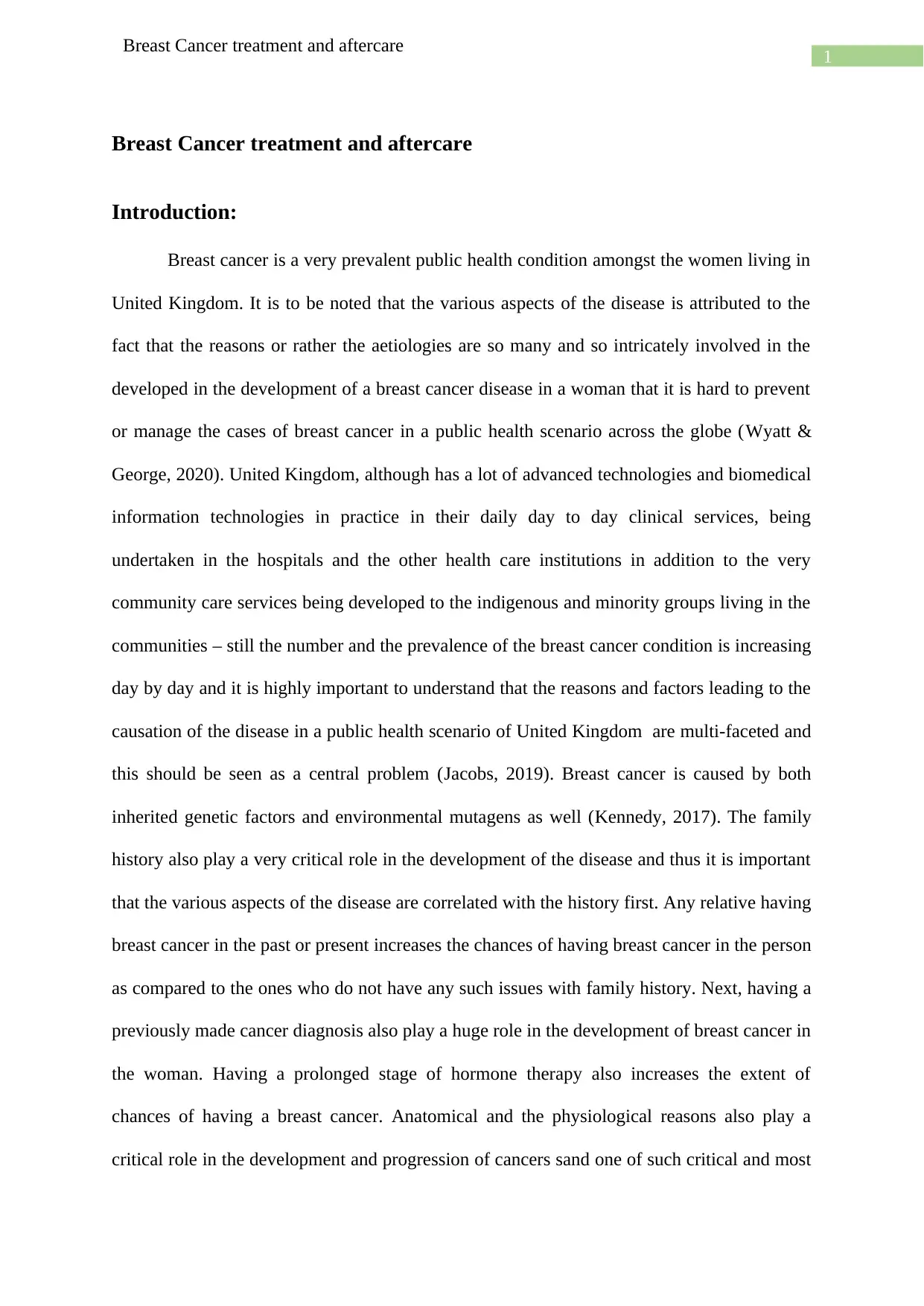
1
Breast Cancer treatment and aftercare
Breast Cancer treatment and aftercare
Introduction:
Breast cancer is a very prevalent public health condition amongst the women living in
United Kingdom. It is to be noted that the various aspects of the disease is attributed to the
fact that the reasons or rather the aetiologies are so many and so intricately involved in the
developed in the development of a breast cancer disease in a woman that it is hard to prevent
or manage the cases of breast cancer in a public health scenario across the globe (Wyatt &
George, 2020). United Kingdom, although has a lot of advanced technologies and biomedical
information technologies in practice in their daily day to day clinical services, being
undertaken in the hospitals and the other health care institutions in addition to the very
community care services being developed to the indigenous and minority groups living in the
communities – still the number and the prevalence of the breast cancer condition is increasing
day by day and it is highly important to understand that the reasons and factors leading to the
causation of the disease in a public health scenario of United Kingdom are multi-faceted and
this should be seen as a central problem (Jacobs, 2019). Breast cancer is caused by both
inherited genetic factors and environmental mutagens as well (Kennedy, 2017). The family
history also play a very critical role in the development of the disease and thus it is important
that the various aspects of the disease are correlated with the history first. Any relative having
breast cancer in the past or present increases the chances of having breast cancer in the person
as compared to the ones who do not have any such issues with family history. Next, having a
previously made cancer diagnosis also play a huge role in the development of breast cancer in
the woman. Having a prolonged stage of hormone therapy also increases the extent of
chances of having a breast cancer. Anatomical and the physiological reasons also play a
critical role in the development and progression of cancers sand one of such critical and most
Breast Cancer treatment and aftercare
Breast Cancer treatment and aftercare
Introduction:
Breast cancer is a very prevalent public health condition amongst the women living in
United Kingdom. It is to be noted that the various aspects of the disease is attributed to the
fact that the reasons or rather the aetiologies are so many and so intricately involved in the
developed in the development of a breast cancer disease in a woman that it is hard to prevent
or manage the cases of breast cancer in a public health scenario across the globe (Wyatt &
George, 2020). United Kingdom, although has a lot of advanced technologies and biomedical
information technologies in practice in their daily day to day clinical services, being
undertaken in the hospitals and the other health care institutions in addition to the very
community care services being developed to the indigenous and minority groups living in the
communities – still the number and the prevalence of the breast cancer condition is increasing
day by day and it is highly important to understand that the reasons and factors leading to the
causation of the disease in a public health scenario of United Kingdom are multi-faceted and
this should be seen as a central problem (Jacobs, 2019). Breast cancer is caused by both
inherited genetic factors and environmental mutagens as well (Kennedy, 2017). The family
history also play a very critical role in the development of the disease and thus it is important
that the various aspects of the disease are correlated with the history first. Any relative having
breast cancer in the past or present increases the chances of having breast cancer in the person
as compared to the ones who do not have any such issues with family history. Next, having a
previously made cancer diagnosis also play a huge role in the development of breast cancer in
the woman. Having a prolonged stage of hormone therapy also increases the extent of
chances of having a breast cancer. Anatomical and the physiological reasons also play a
critical role in the development and progression of cancers sand one of such critical and most
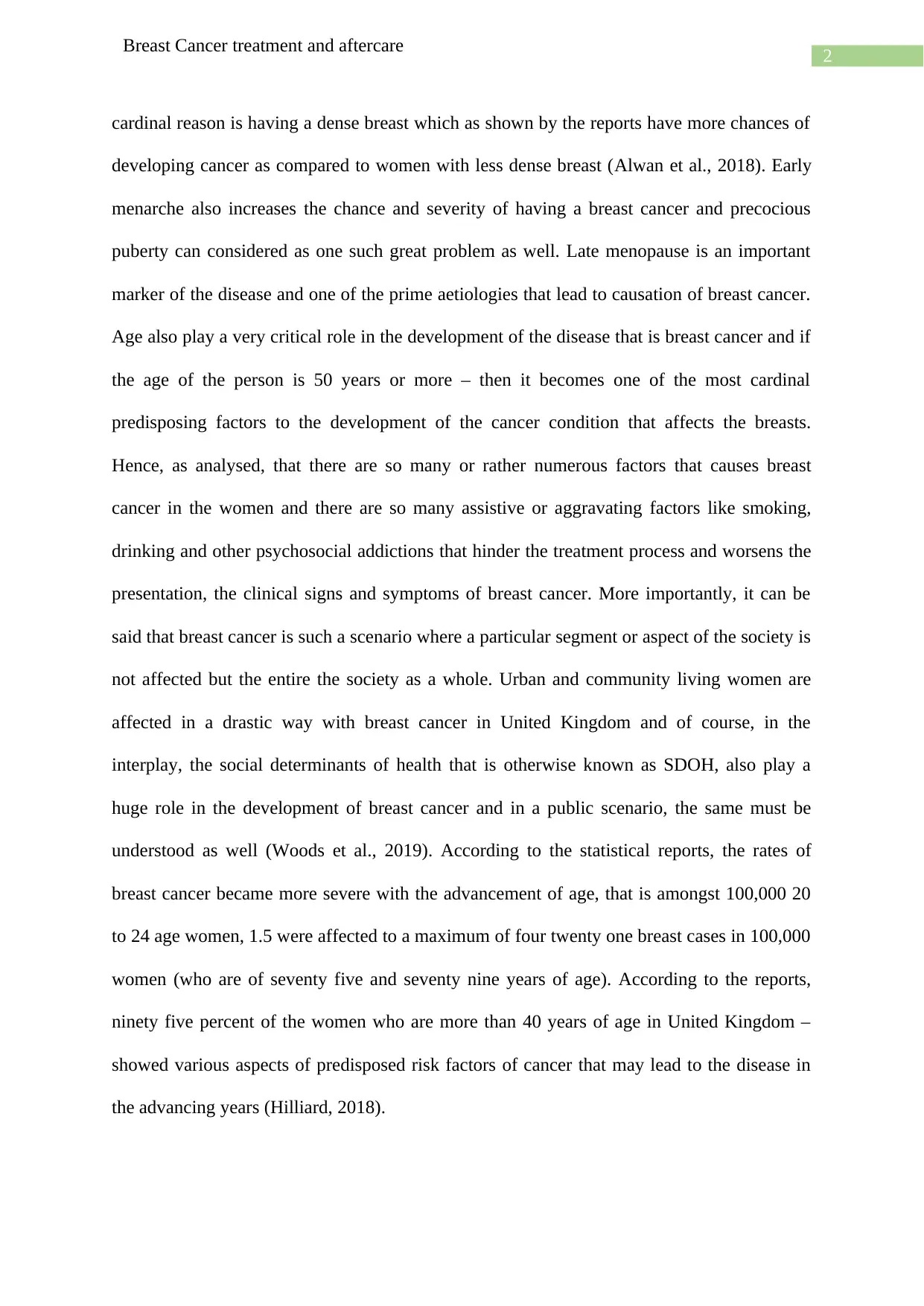
2
Breast Cancer treatment and aftercare
cardinal reason is having a dense breast which as shown by the reports have more chances of
developing cancer as compared to women with less dense breast (Alwan et al., 2018). Early
menarche also increases the chance and severity of having a breast cancer and precocious
puberty can considered as one such great problem as well. Late menopause is an important
marker of the disease and one of the prime aetiologies that lead to causation of breast cancer.
Age also play a very critical role in the development of the disease that is breast cancer and if
the age of the person is 50 years or more – then it becomes one of the most cardinal
predisposing factors to the development of the cancer condition that affects the breasts.
Hence, as analysed, that there are so many or rather numerous factors that causes breast
cancer in the women and there are so many assistive or aggravating factors like smoking,
drinking and other psychosocial addictions that hinder the treatment process and worsens the
presentation, the clinical signs and symptoms of breast cancer. More importantly, it can be
said that breast cancer is such a scenario where a particular segment or aspect of the society is
not affected but the entire the society as a whole. Urban and community living women are
affected in a drastic way with breast cancer in United Kingdom and of course, in the
interplay, the social determinants of health that is otherwise known as SDOH, also play a
huge role in the development of breast cancer and in a public scenario, the same must be
understood as well (Woods et al., 2019). According to the statistical reports, the rates of
breast cancer became more severe with the advancement of age, that is amongst 100,000 20
to 24 age women, 1.5 were affected to a maximum of four twenty one breast cases in 100,000
women (who are of seventy five and seventy nine years of age). According to the reports,
ninety five percent of the women who are more than 40 years of age in United Kingdom –
showed various aspects of predisposed risk factors of cancer that may lead to the disease in
the advancing years (Hilliard, 2018).
Breast Cancer treatment and aftercare
cardinal reason is having a dense breast which as shown by the reports have more chances of
developing cancer as compared to women with less dense breast (Alwan et al., 2018). Early
menarche also increases the chance and severity of having a breast cancer and precocious
puberty can considered as one such great problem as well. Late menopause is an important
marker of the disease and one of the prime aetiologies that lead to causation of breast cancer.
Age also play a very critical role in the development of the disease that is breast cancer and if
the age of the person is 50 years or more – then it becomes one of the most cardinal
predisposing factors to the development of the cancer condition that affects the breasts.
Hence, as analysed, that there are so many or rather numerous factors that causes breast
cancer in the women and there are so many assistive or aggravating factors like smoking,
drinking and other psychosocial addictions that hinder the treatment process and worsens the
presentation, the clinical signs and symptoms of breast cancer. More importantly, it can be
said that breast cancer is such a scenario where a particular segment or aspect of the society is
not affected but the entire the society as a whole. Urban and community living women are
affected in a drastic way with breast cancer in United Kingdom and of course, in the
interplay, the social determinants of health that is otherwise known as SDOH, also play a
huge role in the development of breast cancer and in a public scenario, the same must be
understood as well (Woods et al., 2019). According to the statistical reports, the rates of
breast cancer became more severe with the advancement of age, that is amongst 100,000 20
to 24 age women, 1.5 were affected to a maximum of four twenty one breast cases in 100,000
women (who are of seventy five and seventy nine years of age). According to the reports,
ninety five percent of the women who are more than 40 years of age in United Kingdom –
showed various aspects of predisposed risk factors of cancer that may lead to the disease in
the advancing years (Hilliard, 2018).
⊘ This is a preview!⊘
Do you want full access?
Subscribe today to unlock all pages.

Trusted by 1+ million students worldwide
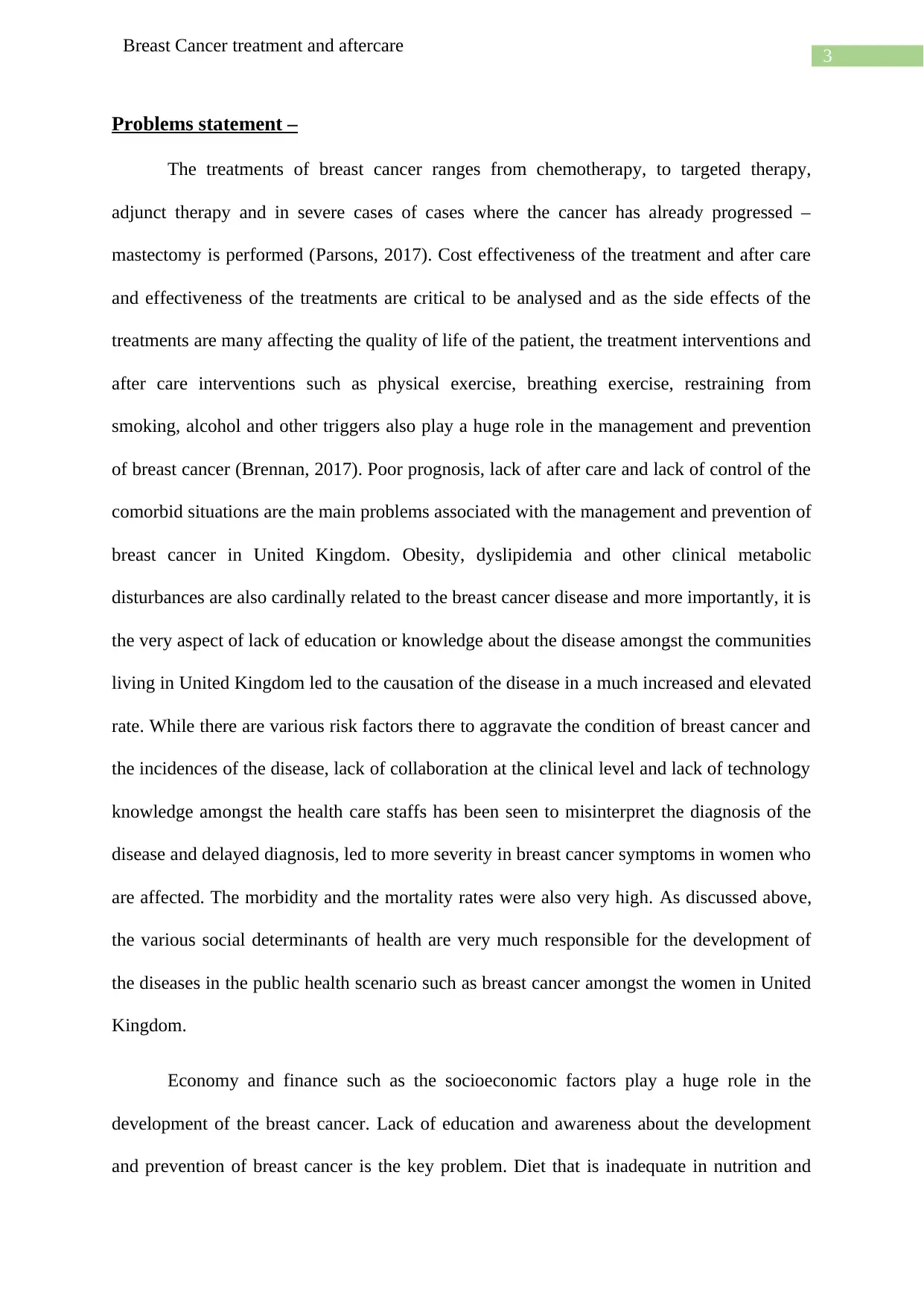
3
Breast Cancer treatment and aftercare
Problems statement –
The treatments of breast cancer ranges from chemotherapy, to targeted therapy,
adjunct therapy and in severe cases of cases where the cancer has already progressed –
mastectomy is performed (Parsons, 2017). Cost effectiveness of the treatment and after care
and effectiveness of the treatments are critical to be analysed and as the side effects of the
treatments are many affecting the quality of life of the patient, the treatment interventions and
after care interventions such as physical exercise, breathing exercise, restraining from
smoking, alcohol and other triggers also play a huge role in the management and prevention
of breast cancer (Brennan, 2017). Poor prognosis, lack of after care and lack of control of the
comorbid situations are the main problems associated with the management and prevention of
breast cancer in United Kingdom. Obesity, dyslipidemia and other clinical metabolic
disturbances are also cardinally related to the breast cancer disease and more importantly, it is
the very aspect of lack of education or knowledge about the disease amongst the communities
living in United Kingdom led to the causation of the disease in a much increased and elevated
rate. While there are various risk factors there to aggravate the condition of breast cancer and
the incidences of the disease, lack of collaboration at the clinical level and lack of technology
knowledge amongst the health care staffs has been seen to misinterpret the diagnosis of the
disease and delayed diagnosis, led to more severity in breast cancer symptoms in women who
are affected. The morbidity and the mortality rates were also very high. As discussed above,
the various social determinants of health are very much responsible for the development of
the diseases in the public health scenario such as breast cancer amongst the women in United
Kingdom.
Economy and finance such as the socioeconomic factors play a huge role in the
development of the breast cancer. Lack of education and awareness about the development
and prevention of breast cancer is the key problem. Diet that is inadequate in nutrition and
Breast Cancer treatment and aftercare
Problems statement –
The treatments of breast cancer ranges from chemotherapy, to targeted therapy,
adjunct therapy and in severe cases of cases where the cancer has already progressed –
mastectomy is performed (Parsons, 2017). Cost effectiveness of the treatment and after care
and effectiveness of the treatments are critical to be analysed and as the side effects of the
treatments are many affecting the quality of life of the patient, the treatment interventions and
after care interventions such as physical exercise, breathing exercise, restraining from
smoking, alcohol and other triggers also play a huge role in the management and prevention
of breast cancer (Brennan, 2017). Poor prognosis, lack of after care and lack of control of the
comorbid situations are the main problems associated with the management and prevention of
breast cancer in United Kingdom. Obesity, dyslipidemia and other clinical metabolic
disturbances are also cardinally related to the breast cancer disease and more importantly, it is
the very aspect of lack of education or knowledge about the disease amongst the communities
living in United Kingdom led to the causation of the disease in a much increased and elevated
rate. While there are various risk factors there to aggravate the condition of breast cancer and
the incidences of the disease, lack of collaboration at the clinical level and lack of technology
knowledge amongst the health care staffs has been seen to misinterpret the diagnosis of the
disease and delayed diagnosis, led to more severity in breast cancer symptoms in women who
are affected. The morbidity and the mortality rates were also very high. As discussed above,
the various social determinants of health are very much responsible for the development of
the diseases in the public health scenario such as breast cancer amongst the women in United
Kingdom.
Economy and finance such as the socioeconomic factors play a huge role in the
development of the breast cancer. Lack of education and awareness about the development
and prevention of breast cancer is the key problem. Diet that is inadequate in nutrition and
Paraphrase This Document
Need a fresh take? Get an instant paraphrase of this document with our AI Paraphraser
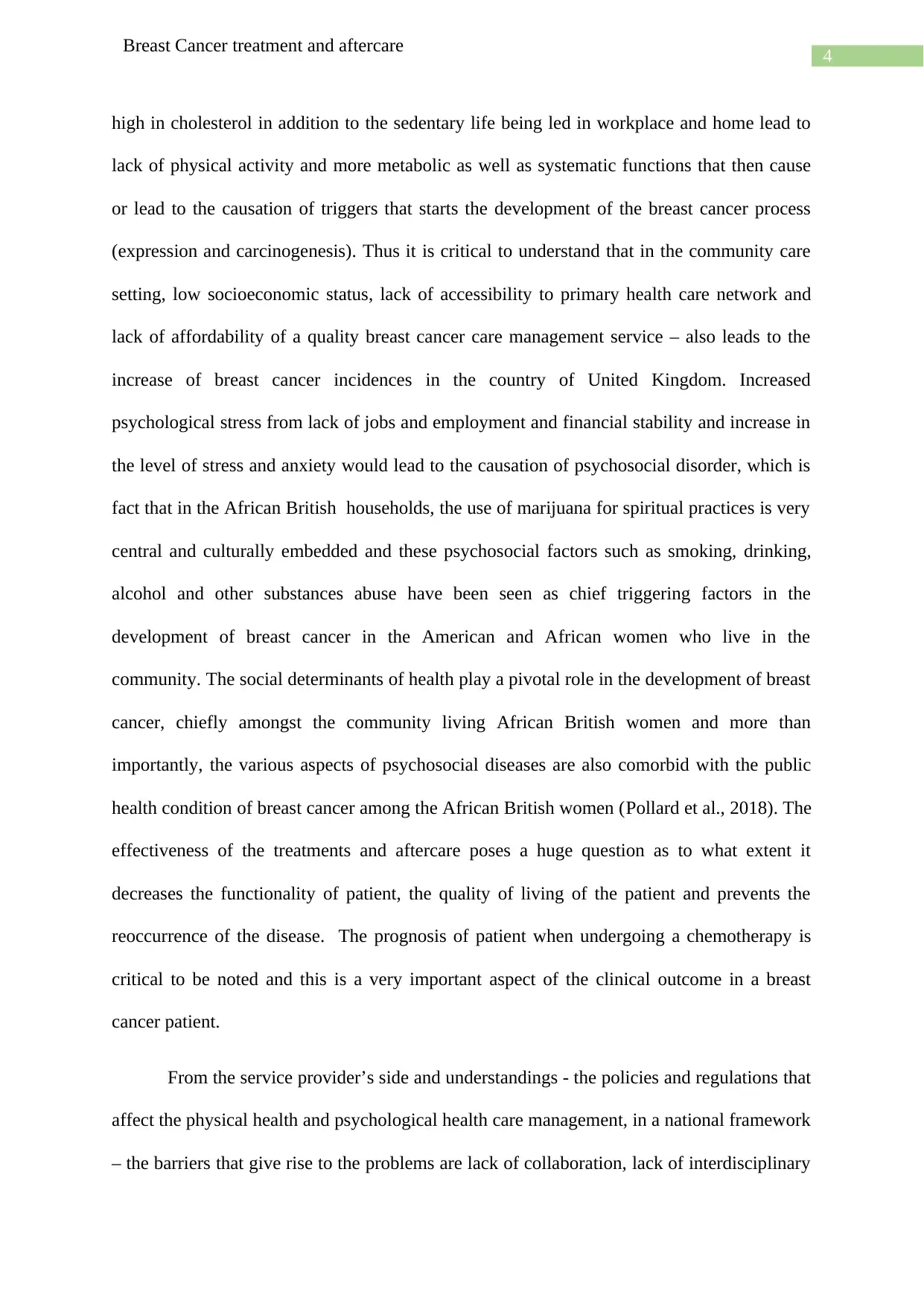
4
Breast Cancer treatment and aftercare
high in cholesterol in addition to the sedentary life being led in workplace and home lead to
lack of physical activity and more metabolic as well as systematic functions that then cause
or lead to the causation of triggers that starts the development of the breast cancer process
(expression and carcinogenesis). Thus it is critical to understand that in the community care
setting, low socioeconomic status, lack of accessibility to primary health care network and
lack of affordability of a quality breast cancer care management service – also leads to the
increase of breast cancer incidences in the country of United Kingdom. Increased
psychological stress from lack of jobs and employment and financial stability and increase in
the level of stress and anxiety would lead to the causation of psychosocial disorder, which is
fact that in the African British households, the use of marijuana for spiritual practices is very
central and culturally embedded and these psychosocial factors such as smoking, drinking,
alcohol and other substances abuse have been seen as chief triggering factors in the
development of breast cancer in the American and African women who live in the
community. The social determinants of health play a pivotal role in the development of breast
cancer, chiefly amongst the community living African British women and more than
importantly, the various aspects of psychosocial diseases are also comorbid with the public
health condition of breast cancer among the African British women (Pollard et al., 2018). The
effectiveness of the treatments and aftercare poses a huge question as to what extent it
decreases the functionality of patient, the quality of living of the patient and prevents the
reoccurrence of the disease. The prognosis of patient when undergoing a chemotherapy is
critical to be noted and this is a very important aspect of the clinical outcome in a breast
cancer patient.
From the service provider’s side and understandings - the policies and regulations that
affect the physical health and psychological health care management, in a national framework
– the barriers that give rise to the problems are lack of collaboration, lack of interdisciplinary
Breast Cancer treatment and aftercare
high in cholesterol in addition to the sedentary life being led in workplace and home lead to
lack of physical activity and more metabolic as well as systematic functions that then cause
or lead to the causation of triggers that starts the development of the breast cancer process
(expression and carcinogenesis). Thus it is critical to understand that in the community care
setting, low socioeconomic status, lack of accessibility to primary health care network and
lack of affordability of a quality breast cancer care management service – also leads to the
increase of breast cancer incidences in the country of United Kingdom. Increased
psychological stress from lack of jobs and employment and financial stability and increase in
the level of stress and anxiety would lead to the causation of psychosocial disorder, which is
fact that in the African British households, the use of marijuana for spiritual practices is very
central and culturally embedded and these psychosocial factors such as smoking, drinking,
alcohol and other substances abuse have been seen as chief triggering factors in the
development of breast cancer in the American and African women who live in the
community. The social determinants of health play a pivotal role in the development of breast
cancer, chiefly amongst the community living African British women and more than
importantly, the various aspects of psychosocial diseases are also comorbid with the public
health condition of breast cancer among the African British women (Pollard et al., 2018). The
effectiveness of the treatments and aftercare poses a huge question as to what extent it
decreases the functionality of patient, the quality of living of the patient and prevents the
reoccurrence of the disease. The prognosis of patient when undergoing a chemotherapy is
critical to be noted and this is a very important aspect of the clinical outcome in a breast
cancer patient.
From the service provider’s side and understandings - the policies and regulations that
affect the physical health and psychological health care management, in a national framework
– the barriers that give rise to the problems are lack of collaboration, lack of interdisciplinary
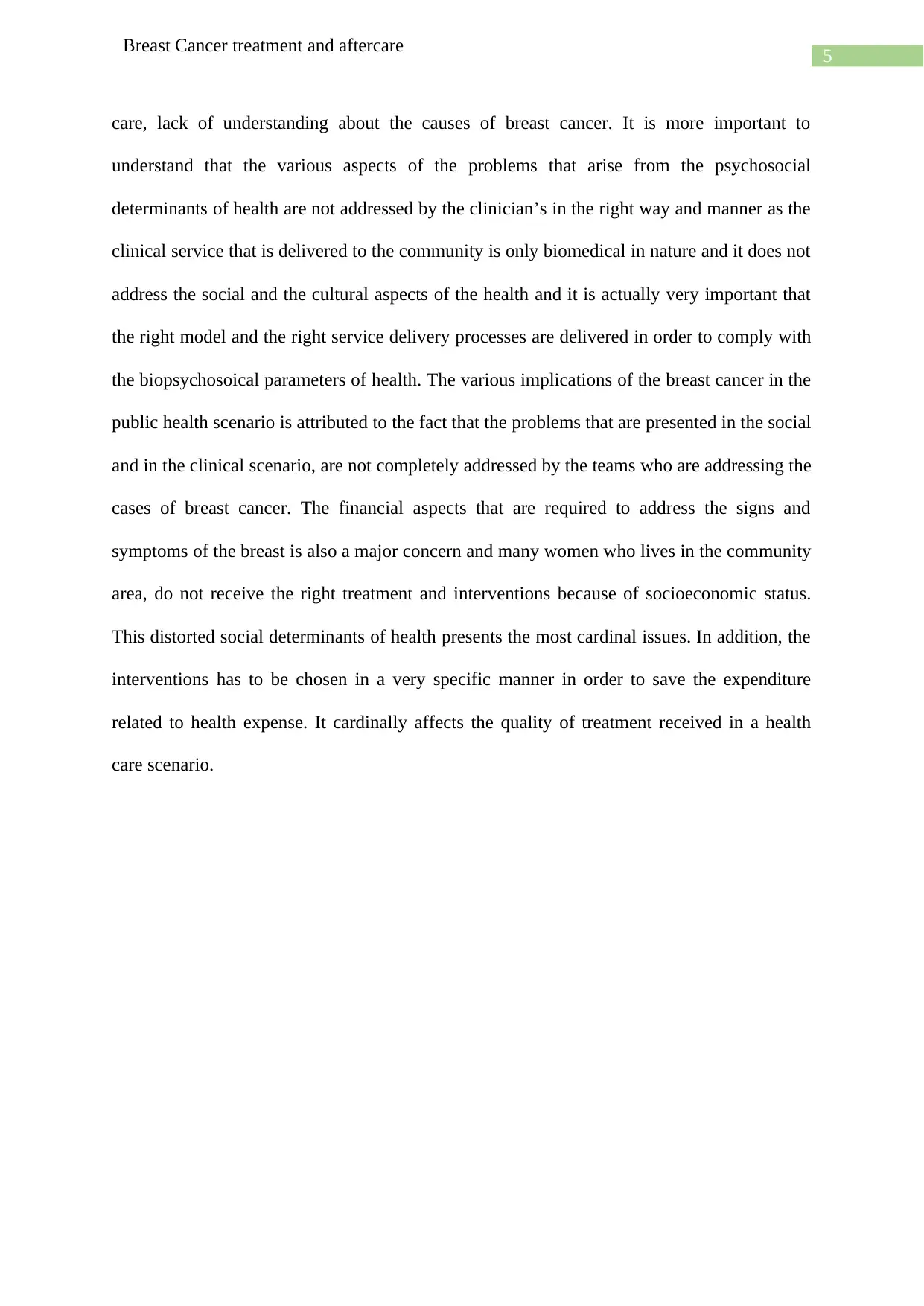
5
Breast Cancer treatment and aftercare
care, lack of understanding about the causes of breast cancer. It is more important to
understand that the various aspects of the problems that arise from the psychosocial
determinants of health are not addressed by the clinician’s in the right way and manner as the
clinical service that is delivered to the community is only biomedical in nature and it does not
address the social and the cultural aspects of the health and it is actually very important that
the right model and the right service delivery processes are delivered in order to comply with
the biopsychosoical parameters of health. The various implications of the breast cancer in the
public health scenario is attributed to the fact that the problems that are presented in the social
and in the clinical scenario, are not completely addressed by the teams who are addressing the
cases of breast cancer. The financial aspects that are required to address the signs and
symptoms of the breast is also a major concern and many women who lives in the community
area, do not receive the right treatment and interventions because of socioeconomic status.
This distorted social determinants of health presents the most cardinal issues. In addition, the
interventions has to be chosen in a very specific manner in order to save the expenditure
related to health expense. It cardinally affects the quality of treatment received in a health
care scenario.
Breast Cancer treatment and aftercare
care, lack of understanding about the causes of breast cancer. It is more important to
understand that the various aspects of the problems that arise from the psychosocial
determinants of health are not addressed by the clinician’s in the right way and manner as the
clinical service that is delivered to the community is only biomedical in nature and it does not
address the social and the cultural aspects of the health and it is actually very important that
the right model and the right service delivery processes are delivered in order to comply with
the biopsychosoical parameters of health. The various implications of the breast cancer in the
public health scenario is attributed to the fact that the problems that are presented in the social
and in the clinical scenario, are not completely addressed by the teams who are addressing the
cases of breast cancer. The financial aspects that are required to address the signs and
symptoms of the breast is also a major concern and many women who lives in the community
area, do not receive the right treatment and interventions because of socioeconomic status.
This distorted social determinants of health presents the most cardinal issues. In addition, the
interventions has to be chosen in a very specific manner in order to save the expenditure
related to health expense. It cardinally affects the quality of treatment received in a health
care scenario.
⊘ This is a preview!⊘
Do you want full access?
Subscribe today to unlock all pages.

Trusted by 1+ million students worldwide
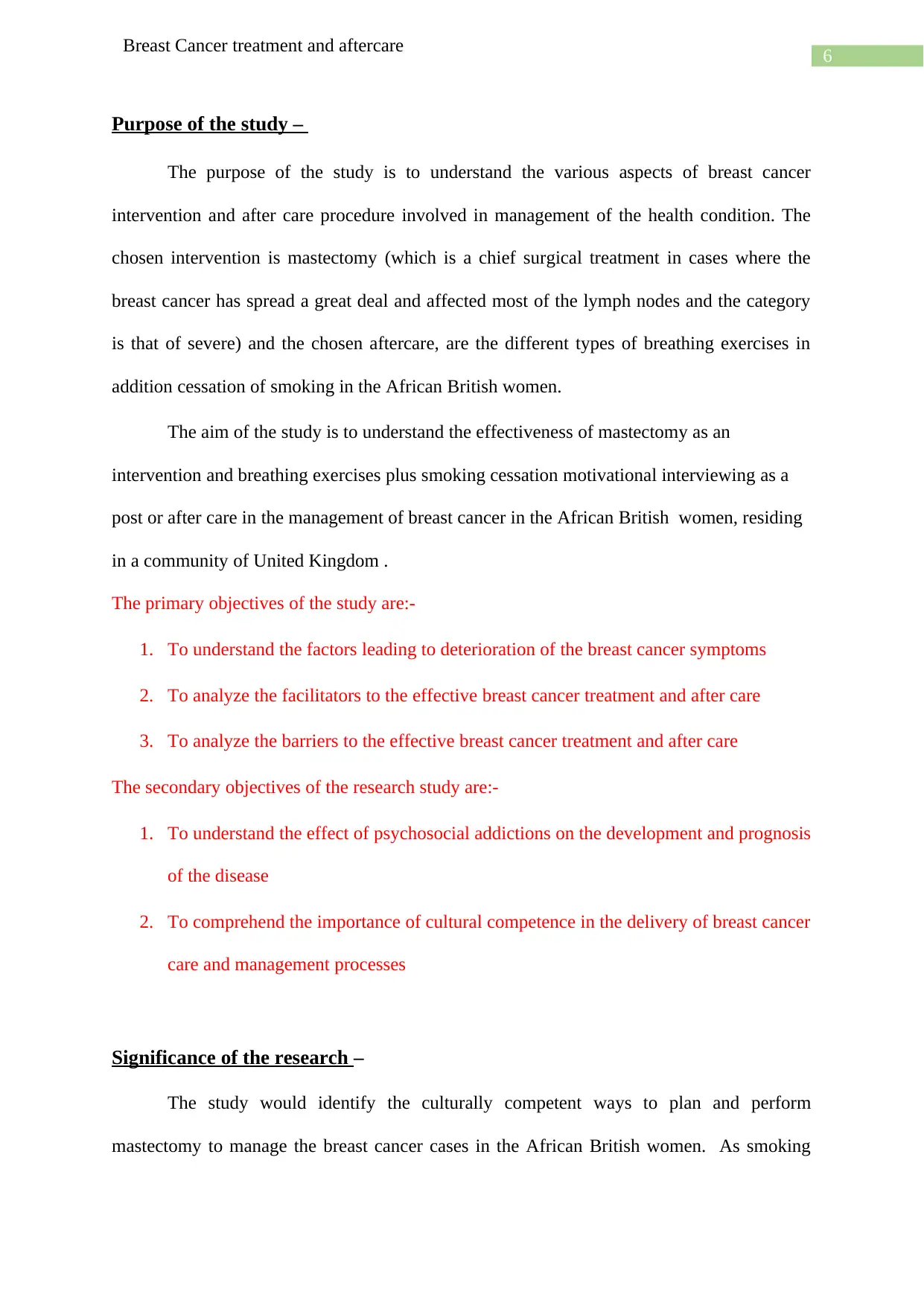
6
Breast Cancer treatment and aftercare
Purpose of the study –
The purpose of the study is to understand the various aspects of breast cancer
intervention and after care procedure involved in management of the health condition. The
chosen intervention is mastectomy (which is a chief surgical treatment in cases where the
breast cancer has spread a great deal and affected most of the lymph nodes and the category
is that of severe) and the chosen aftercare, are the different types of breathing exercises in
addition cessation of smoking in the African British women.
The aim of the study is to understand the effectiveness of mastectomy as an
intervention and breathing exercises plus smoking cessation motivational interviewing as a
post or after care in the management of breast cancer in the African British women, residing
in a community of United Kingdom .
The primary objectives of the study are:-
1. To understand the factors leading to deterioration of the breast cancer symptoms
2. To analyze the facilitators to the effective breast cancer treatment and after care
3. To analyze the barriers to the effective breast cancer treatment and after care
The secondary objectives of the research study are:-
1. To understand the effect of psychosocial addictions on the development and prognosis
of the disease
2. To comprehend the importance of cultural competence in the delivery of breast cancer
care and management processes
Significance of the research –
The study would identify the culturally competent ways to plan and perform
mastectomy to manage the breast cancer cases in the African British women. As smoking
Breast Cancer treatment and aftercare
Purpose of the study –
The purpose of the study is to understand the various aspects of breast cancer
intervention and after care procedure involved in management of the health condition. The
chosen intervention is mastectomy (which is a chief surgical treatment in cases where the
breast cancer has spread a great deal and affected most of the lymph nodes and the category
is that of severe) and the chosen aftercare, are the different types of breathing exercises in
addition cessation of smoking in the African British women.
The aim of the study is to understand the effectiveness of mastectomy as an
intervention and breathing exercises plus smoking cessation motivational interviewing as a
post or after care in the management of breast cancer in the African British women, residing
in a community of United Kingdom .
The primary objectives of the study are:-
1. To understand the factors leading to deterioration of the breast cancer symptoms
2. To analyze the facilitators to the effective breast cancer treatment and after care
3. To analyze the barriers to the effective breast cancer treatment and after care
The secondary objectives of the research study are:-
1. To understand the effect of psychosocial addictions on the development and prognosis
of the disease
2. To comprehend the importance of cultural competence in the delivery of breast cancer
care and management processes
Significance of the research –
The study would identify the culturally competent ways to plan and perform
mastectomy to manage the breast cancer cases in the African British women. As smoking
Paraphrase This Document
Need a fresh take? Get an instant paraphrase of this document with our AI Paraphraser
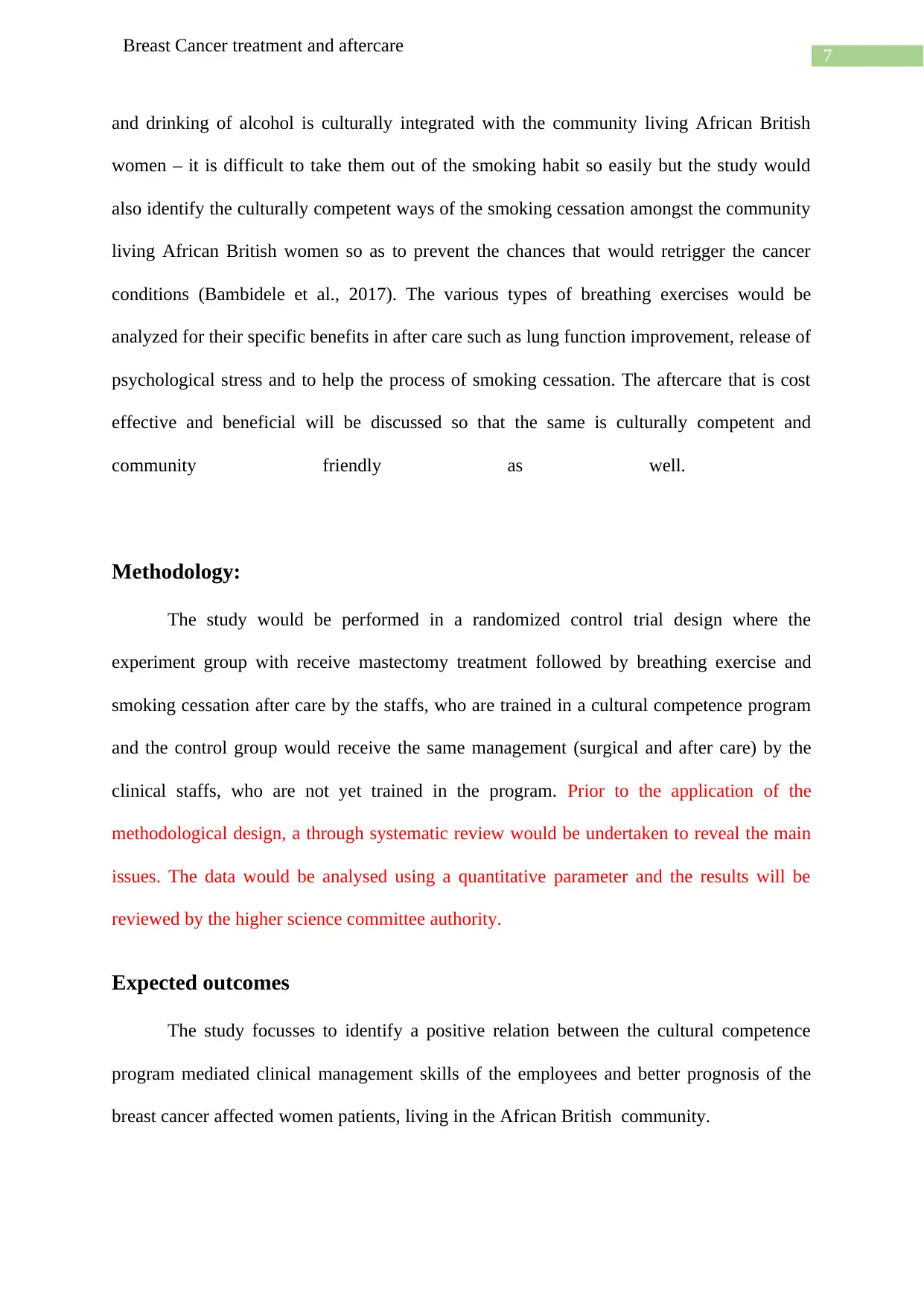
7
Breast Cancer treatment and aftercare
and drinking of alcohol is culturally integrated with the community living African British
women – it is difficult to take them out of the smoking habit so easily but the study would
also identify the culturally competent ways of the smoking cessation amongst the community
living African British women so as to prevent the chances that would retrigger the cancer
conditions (Bambidele et al., 2017). The various types of breathing exercises would be
analyzed for their specific benefits in after care such as lung function improvement, release of
psychological stress and to help the process of smoking cessation. The aftercare that is cost
effective and beneficial will be discussed so that the same is culturally competent and
community friendly as well.
Methodology:
The study would be performed in a randomized control trial design where the
experiment group with receive mastectomy treatment followed by breathing exercise and
smoking cessation after care by the staffs, who are trained in a cultural competence program
and the control group would receive the same management (surgical and after care) by the
clinical staffs, who are not yet trained in the program. Prior to the application of the
methodological design, a through systematic review would be undertaken to reveal the main
issues. The data would be analysed using a quantitative parameter and the results will be
reviewed by the higher science committee authority.
Expected outcomes
The study focusses to identify a positive relation between the cultural competence
program mediated clinical management skills of the employees and better prognosis of the
breast cancer affected women patients, living in the African British community.
Breast Cancer treatment and aftercare
and drinking of alcohol is culturally integrated with the community living African British
women – it is difficult to take them out of the smoking habit so easily but the study would
also identify the culturally competent ways of the smoking cessation amongst the community
living African British women so as to prevent the chances that would retrigger the cancer
conditions (Bambidele et al., 2017). The various types of breathing exercises would be
analyzed for their specific benefits in after care such as lung function improvement, release of
psychological stress and to help the process of smoking cessation. The aftercare that is cost
effective and beneficial will be discussed so that the same is culturally competent and
community friendly as well.
Methodology:
The study would be performed in a randomized control trial design where the
experiment group with receive mastectomy treatment followed by breathing exercise and
smoking cessation after care by the staffs, who are trained in a cultural competence program
and the control group would receive the same management (surgical and after care) by the
clinical staffs, who are not yet trained in the program. Prior to the application of the
methodological design, a through systematic review would be undertaken to reveal the main
issues. The data would be analysed using a quantitative parameter and the results will be
reviewed by the higher science committee authority.
Expected outcomes
The study focusses to identify a positive relation between the cultural competence
program mediated clinical management skills of the employees and better prognosis of the
breast cancer affected women patients, living in the African British community.
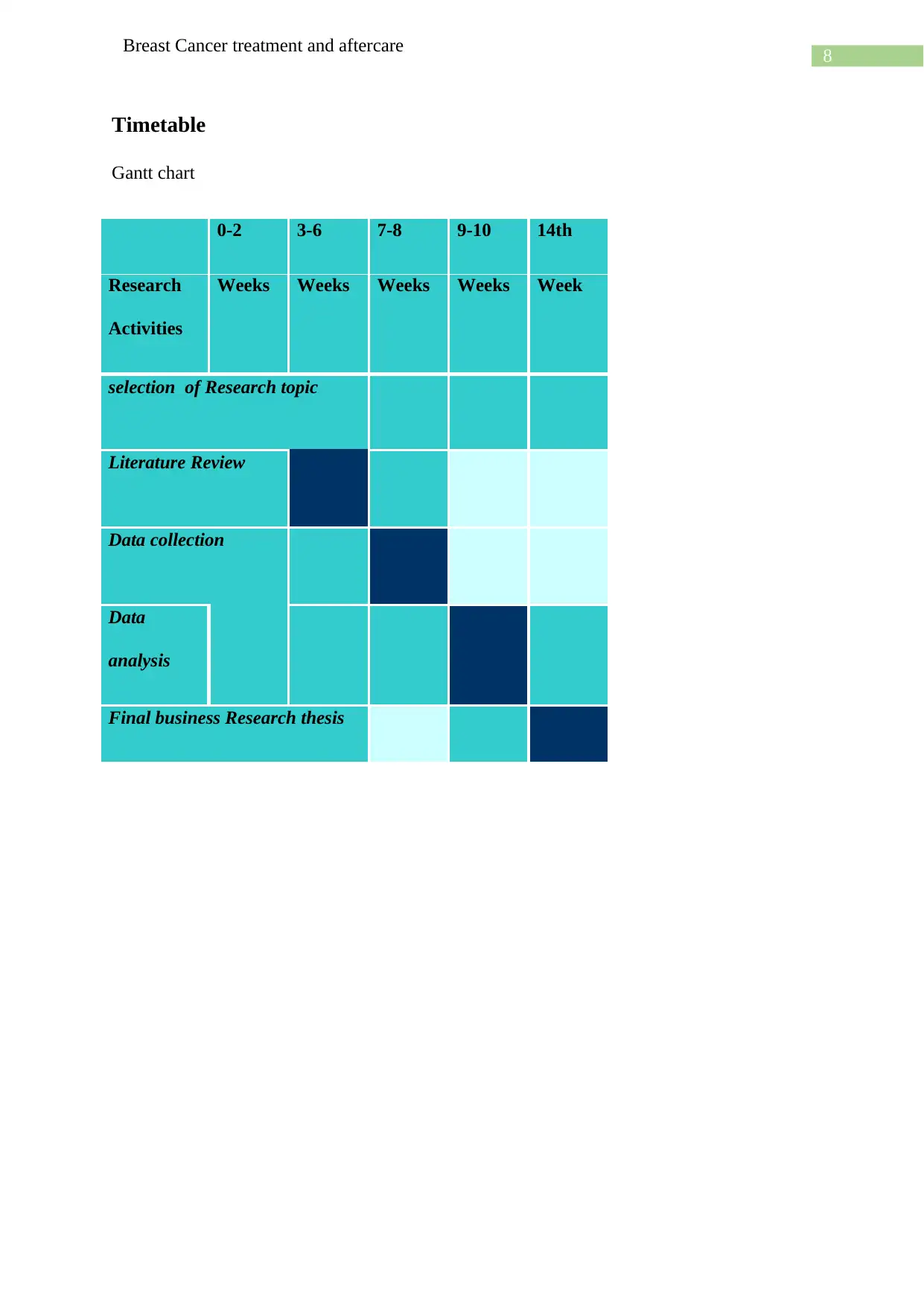
8
Breast Cancer treatment and aftercare
Timetable
Gantt chart
0-2 3-6 7-8 9-10 14th
Research
Activities
Weeks Weeks Weeks Weeks Week
selection of Research topic
Literature Review
Data collection
Data
analysis
Final business Research thesis
Breast Cancer treatment and aftercare
Timetable
Gantt chart
0-2 3-6 7-8 9-10 14th
Research
Activities
Weeks Weeks Weeks Weeks Week
selection of Research topic
Literature Review
Data collection
Data
analysis
Final business Research thesis
⊘ This is a preview!⊘
Do you want full access?
Subscribe today to unlock all pages.

Trusted by 1+ million students worldwide
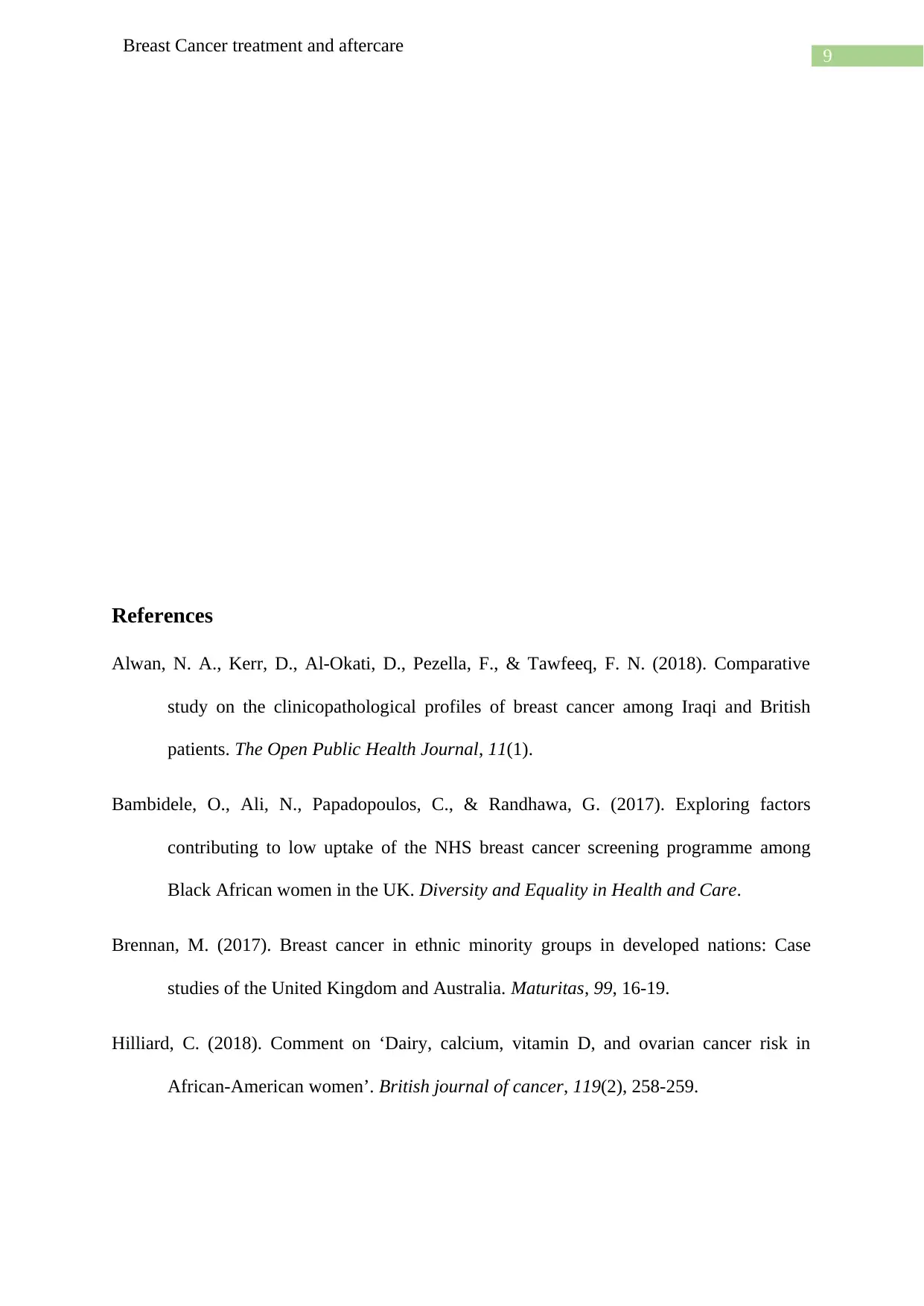
9
Breast Cancer treatment and aftercare
References
Alwan, N. A., Kerr, D., Al-Okati, D., Pezella, F., & Tawfeeq, F. N. (2018). Comparative
study on the clinicopathological profiles of breast cancer among Iraqi and British
patients. The Open Public Health Journal, 11(1).
Bambidele, O., Ali, N., Papadopoulos, C., & Randhawa, G. (2017). Exploring factors
contributing to low uptake of the NHS breast cancer screening programme among
Black African women in the UK. Diversity and Equality in Health and Care.
Brennan, M. (2017). Breast cancer in ethnic minority groups in developed nations: Case
studies of the United Kingdom and Australia. Maturitas, 99, 16-19.
Hilliard, C. (2018). Comment on ‘Dairy, calcium, vitamin D, and ovarian cancer risk in
African-American women’. British journal of cancer, 119(2), 258-259.
Breast Cancer treatment and aftercare
References
Alwan, N. A., Kerr, D., Al-Okati, D., Pezella, F., & Tawfeeq, F. N. (2018). Comparative
study on the clinicopathological profiles of breast cancer among Iraqi and British
patients. The Open Public Health Journal, 11(1).
Bambidele, O., Ali, N., Papadopoulos, C., & Randhawa, G. (2017). Exploring factors
contributing to low uptake of the NHS breast cancer screening programme among
Black African women in the UK. Diversity and Equality in Health and Care.
Brennan, M. (2017). Breast cancer in ethnic minority groups in developed nations: Case
studies of the United Kingdom and Australia. Maturitas, 99, 16-19.
Hilliard, C. (2018). Comment on ‘Dairy, calcium, vitamin D, and ovarian cancer risk in
African-American women’. British journal of cancer, 119(2), 258-259.
Paraphrase This Document
Need a fresh take? Get an instant paraphrase of this document with our AI Paraphraser
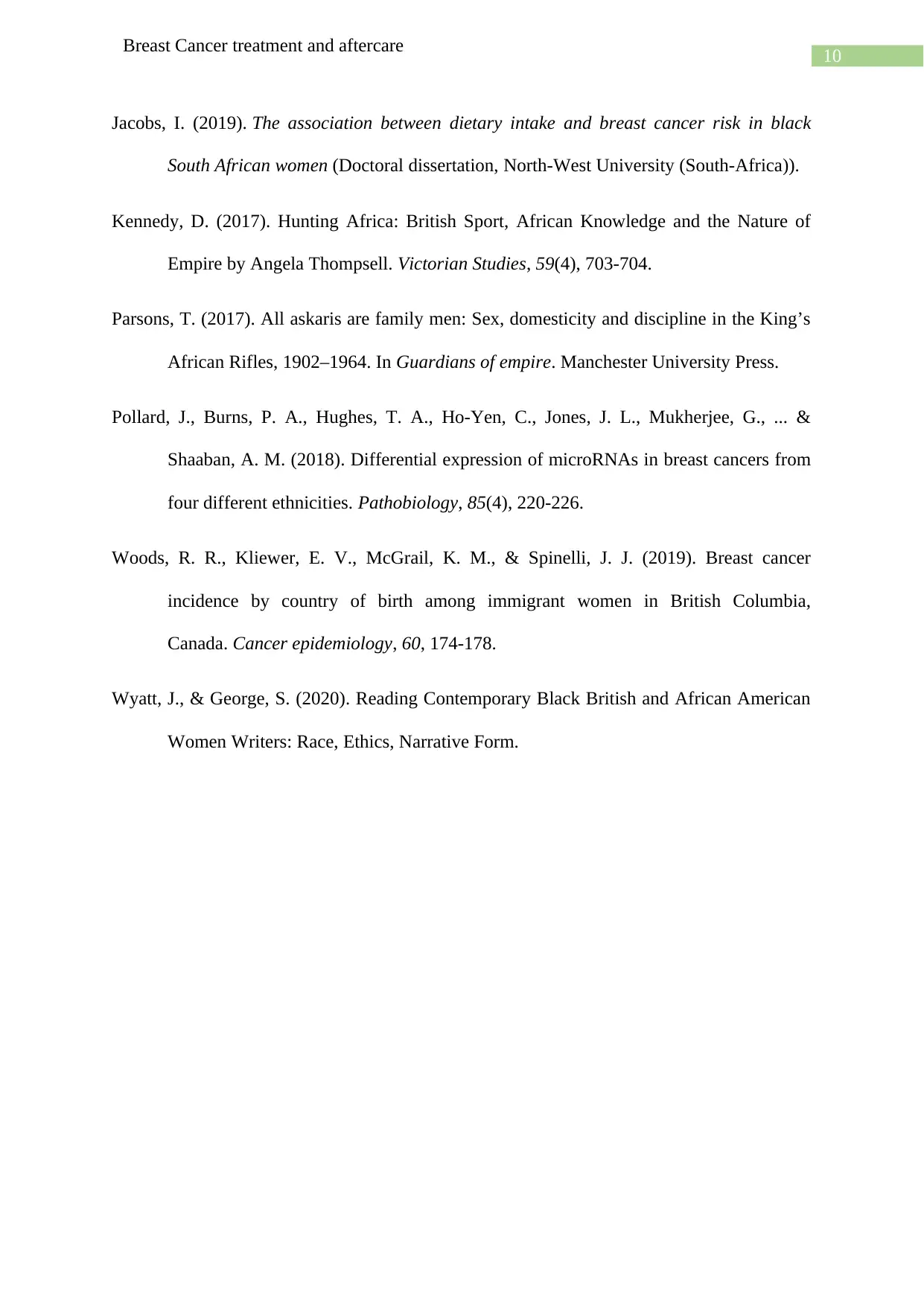
10
Breast Cancer treatment and aftercare
Jacobs, I. (2019). The association between dietary intake and breast cancer risk in black
South African women (Doctoral dissertation, North-West University (South-Africa)).
Kennedy, D. (2017). Hunting Africa: British Sport, African Knowledge and the Nature of
Empire by Angela Thompsell. Victorian Studies, 59(4), 703-704.
Parsons, T. (2017). All askaris are family men: Sex, domesticity and discipline in the King’s
African Rifles, 1902–1964. In Guardians of empire. Manchester University Press.
Pollard, J., Burns, P. A., Hughes, T. A., Ho-Yen, C., Jones, J. L., Mukherjee, G., ... &
Shaaban, A. M. (2018). Differential expression of microRNAs in breast cancers from
four different ethnicities. Pathobiology, 85(4), 220-226.
Woods, R. R., Kliewer, E. V., McGrail, K. M., & Spinelli, J. J. (2019). Breast cancer
incidence by country of birth among immigrant women in British Columbia,
Canada. Cancer epidemiology, 60, 174-178.
Wyatt, J., & George, S. (2020). Reading Contemporary Black British and African American
Women Writers: Race, Ethics, Narrative Form.
Breast Cancer treatment and aftercare
Jacobs, I. (2019). The association between dietary intake and breast cancer risk in black
South African women (Doctoral dissertation, North-West University (South-Africa)).
Kennedy, D. (2017). Hunting Africa: British Sport, African Knowledge and the Nature of
Empire by Angela Thompsell. Victorian Studies, 59(4), 703-704.
Parsons, T. (2017). All askaris are family men: Sex, domesticity and discipline in the King’s
African Rifles, 1902–1964. In Guardians of empire. Manchester University Press.
Pollard, J., Burns, P. A., Hughes, T. A., Ho-Yen, C., Jones, J. L., Mukherjee, G., ... &
Shaaban, A. M. (2018). Differential expression of microRNAs in breast cancers from
four different ethnicities. Pathobiology, 85(4), 220-226.
Woods, R. R., Kliewer, E. V., McGrail, K. M., & Spinelli, J. J. (2019). Breast cancer
incidence by country of birth among immigrant women in British Columbia,
Canada. Cancer epidemiology, 60, 174-178.
Wyatt, J., & George, S. (2020). Reading Contemporary Black British and African American
Women Writers: Race, Ethics, Narrative Form.
1 out of 11
Related Documents
Your All-in-One AI-Powered Toolkit for Academic Success.
+13062052269
info@desklib.com
Available 24*7 on WhatsApp / Email
![[object Object]](/_next/static/media/star-bottom.7253800d.svg)
Unlock your academic potential
Copyright © 2020–2026 A2Z Services. All Rights Reserved. Developed and managed by ZUCOL.




